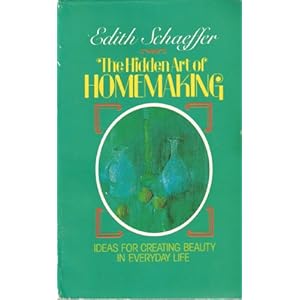- Higher Up and Further - (No longer active, but the archives are full of wisdom.)
- High Desert Home - (Another one who, also, sadly is no longer blogging, but making life beautiful elsewhere, no doubt.)
- Pleasant View Schoolhouse - (Has a signed copy of one of her books.)
- Flourishing Mother - (A lovely blog that inspires me each time.)
 So I jotted it down on my to-be-read list and eventually bought a signed copy on eBay. Isn't the illustration lovely? Then the poor book languished (as so many do) on my to-be-read pile. I just have to wait for the right time before I pick up a book. That is definitely what happened with this one.
So I jotted it down on my to-be-read list and eventually bought a signed copy on eBay. Isn't the illustration lovely? Then the poor book languished (as so many do) on my to-be-read pile. I just have to wait for the right time before I pick up a book. That is definitely what happened with this one. If I had picked up this book when I first heard about it or even when I first purchased it, I would have skimmed the first chapter and put it back on the shelf. Until recently, I bristled at the thought of God as my Creator, the Creator. I am the creator. I wrote this. I made this. I...I...I....me...me...me. Give credit to some invisible other? Nonsense! But, oh, how the heart changes. Now, though I still have doubts, I can read about the Creator and be comforted and encouraged. I am a creative being made by a creative force (God) in His spiritual image.
And that, my friends, is how Edith Schaeffer begins this lovely book. If you are turned off by the religious overtones, I recommend that you read it anyway. It is a delightful book for anyone wanting to make their (home) life more beautiful by (re)discovering their talents. It is all about intentional living. The areas of "hidden art" include music; painting, sketching, scultping; interior decoration; gardens and gardening; flower arrangments; food; writing - prose and poetry; drama; creative recreation; clothing; integration; and environment. She encourages her readers to explore each of these areas in simple ways such as playing that instrument you learned as a child, writing letters to friends, reading aloud, planting flowers in a sunny place and going for long walks. She makes all of these things sound like not just good ideas but necessities for living a full and rich life!
The Hidden Art of Homemaking is a book that I could turn to often for encouragement. Each page has a quote or phrase that jumps out at me to contemplate. Reading this book is like reading poetry. It puts me in a higher frame of mind. It encourages me to see the world as a more beautiful place. She writes:
I feel strongly that this modern fear of home becoming non-existent can be countered only if those of us who want to be sure our little spot is really a home take very practical measures to be sure that it is just that, and not a collection of furniture sitting in some sort of enclosure being protected from wind and storm.As I read through the chapters I have been inspired to begin making small changes in our home. I bought a lovely set of candlesticks at the thrift store and some tapered candles. I try to make time to set a lovely table for everyday meals with the candles and placemats. I've stopped waiting to have a home of our own to make our interior more pleasing and have begun cleaning out and redecorating the children's rooms. I am trying to be more creative on a regular basis. (Writing this blog is helping!) I've been thinking more about why I do things and how to make my personal environment (my attitude and appearance) closer to my true self.
Despite my efforts, I still have a long way to go. I can start by putting my spiritual life (my relationship with God) first with daily prayer and meditation. Second, spend more time clearing and cleaning my physical environment with regular housework. Third, focus more on my relationships by being more mindful of the needs of others and responding with love on a daily (hourly) basis to all. Finally, utilize my time wisely in creative and productive ways and not waste it with unnecessary computer time and idleness. (Though idleness is not all bad. Sometimes one needs to spend time in "wise passiveness," as Wordsworth's writes in his poem "Expostulation and Reply".) Most of all I need to imprint this verse on my brain:
Finally, brothers, whatever is true, whatever is noble, whatever is right, whatever is pure, whatever is lovely, whatever is admirable—if anything is excellent or praiseworthy—think about such things. Philippians 4:8 (New International Version)

No comments:
Post a Comment